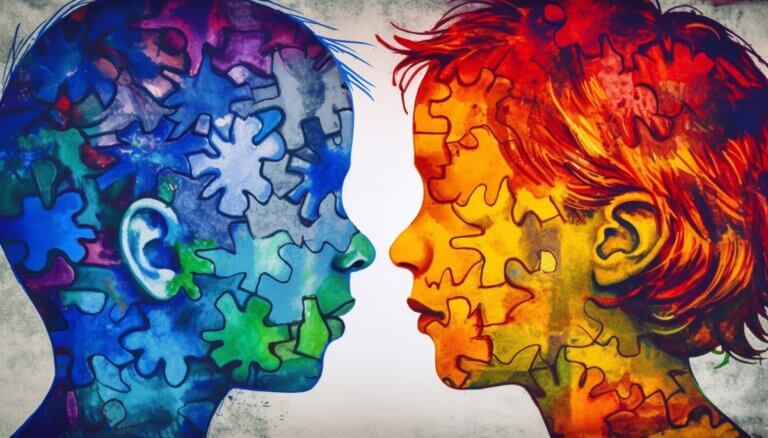Table of Contents
The Dimensions of Emotional Intelligence in Leadership Roles

Self-awareness and Self-regulation
Emotional intelligence in leadership and gender-specific management are at the forefront of many organizational development and personnel strategies. Understanding how leaders can recognize, assess, and modulate their own emotions is essential for a harmonious and productive work climate.
The Role of Self-Awareness
Self-awareness is a central component of Emotional Intelligence. It enables individuals to identify their own emotions and understand their effects on behavior and thinking. Leadership and Gender play a significant role here, as cultural and societal expectations of the emotional expressiveness of men and women differ. A leader of an international team reported how her conscious mirroring of empathy and openness led to her team working closely together even in difficult times. Her ability to understand emotions and respond appropriately created a basis of trust and significantly improved collaboration.
- Scientific studies show that self-awareness is linked to higher job satisfaction and better team performance.
- Emotional intelligence and gender perspectives indicate that women are often attributed to being more emotionally aware, which can be utilized in gender-fair leadership.
- Competent leaders use reflection to sharpen their self-awareness and consciously steer their actions.
The Importance of Self-Regulation
Self-regulation, the second pillar of Emotional Intelligence, refers to the ability to control and modify emotional responses. Especially in diversity aspects like Emotional Intelligence in Diversity, it is evident how important versatile emotional management is. A CEO of a large technology company was able to radiate calmness as well as dose his enthusiasm in negotiations to successfully present innovative projects.
There are also negative examples: A project manager who lacked emotional self-regulation quickly experienced how stress and pressure led to reckless decisions that endangered the team climate and ultimately the project goal.
- Successful self-regulation helps avoid impulsive actions and instead make thoughtful, strategic decisions.
- Studies indicate that leaders who can control their emotions are often perceived as fair and considerate.
- Gender-fair leadership acknowledges that both male and female leaders benefit from strong self-regulation.
The linkage of emotional self-awareness and self-regulation is essential for leaders to align with the needs of a diverse team and achieve sustainable success. Gender perspectives on Emotional Intelligence offer fruitful approaches to lead in a constantly evolving work environment in a gender-fair and successful manner.
Social Awareness and Relationship Management
Emotional intelligence and gender play a crucial role in the context of leadership and collaboration. The ability to recognize and understand emotions in oneself and others is a foundation of gender-equitable leadership. Empathy and relationship management are key components for the development of teams, particularly in terms of diversity. In the following, we will take a closer look at these aspects.
Gender Perspectives in Emotional Intelligence
The concept of Emotional Intelligence in Diversity emphasizes the need to understand different emotional worlds and gender perspectives. Research shows that gender dynamics influence how people process and express emotions. Since emotional intelligence can help overcome unconscious biases, it is key to inclusive leadership that considers and values all genders.
- It has been observed that men and women tend to have different emotional expressions, which challenges leaders to address them individually.
- Leadership and gender are thus inseparably linked with the ability to create an inclusive environment that promotes diversity.
- A focus on Emotional Intelligence and Gender allows for the recognition and utilization of individual strengths to build a strong team spirit.
Relationship Management in Gender-Diverse Teams
Relationship management involves understanding and managing social interactions and relationships, a core competency for team leaders. In gender-diverse teams, it is important to create an atmosphere where all members feel understood and respected.
- Gender-fair communication and conflict resolution are essential to avoid misunderstandings and promote a constructive working atmosphere.
- By training empathy and social sensitivity, collaboration in teams can be improved, positively impacting performance.
- Gender-equitable leadership considers the different needs and expectations of genders and integrates them into the team strategy.
Emotional Intelligence in Diversity is not just an ideal but is increasingly becoming a necessity in the modern workplace. In practice, this means actively listening, being sensitive to non-verbal signals, and having a clear understanding of the diverse emotional maps of each team member. Relationship management builds on this and is characterized by clear, respectful communication and the ability to resolve conflicts constructively. By combining social awareness and skillful relationship management, leaders can establish an inclusive and dynamic leadership practice, paving the way for gender fairness and emotional intelligence in all areas of the company.
Application of Emotional Intelligence in Gender-Diverse Leadership Teams

Gender-Specific Communication and Conflict Resolution
Emotional intelligence and gender play a crucial role in communication and conflict resolution. Men and women often tend to adopt different approaches and styles when it comes to communicating and managing conflicts in the workplace. This can lead to challenges in leadership positions, where diverse teams need to be managed.
Understanding Gender-Specific Communication Styles
It is widely acknowledged that women in communication tend to place more value on relationships and social connections, while men are often more focused on competition and status. Emotional intelligence in diversity involves the ability to recognize and understand these different styles without falling into stereotypes. This means being mindful of how various team members communicate, are motivated, and approach conflicts.
A practical example: A female leader notices that her male team members seem to dominate and choose confrontational approaches in a meeting. With her emotional intelligence, she can steer the conversation in a way that allows quieter voices to be heard and fosters a more inclusive dialogue.
Effective Conflict Resolution Strategies
In gender-fair leadership, it is important to develop conflict resolution strategies that are accessible to all genders. Thus, a key aspect is to create an environment where different approaches to conflicts are accepted and respected. Gender-fair leadership implies finding solutions that do not merely represent compromises but create real synergies between the genders.
- Empathetic communication in conflicts often reveals underlying needs that go beyond mere positional differences.
- By highlighting common goals, conflicts can be resolved from a new perspective, beyond traditional gender roles.
- Instead of avoiding conflicts, leaders should view them as opportunities for innovation and growth.
Improving Team Dynamics Through Emotional Intelligence
By gaining insight into gender perspectives, leaders learn to recognize and promote the strengths of each team member. High emotional intelligence provides the foundation to view differences in communication and conflict resolution not as obstacles, but as enrichments.
A team that constructively uses conflicts to learn from each other and develop further benefits from leadership that not only allows but actively promotes the diversity of communication and conflict resolution styles. In doing so, misunderstandings are bridged and solutions are created that take into account and utilize the individual skills of all team members. The emotional intelligence of the leader is key to collective success.
Promotion of Gender Equality and Inclusion
Emotional Intelligence (EQ) is key to creating a workplace culture based on gender equality and inclusion. At the intersection of Emotional Intelligence and Gender, we find a domain particularly relevant for leaders to establish and maintain inclusive and fair structures. Leaders endowed with high EQ are capable of creating an environment where all employees, regardless of their gender, are valued and can fully realize their potential.
Gender-Fair Leadership through EQ
Gender-fair leadership begins with self-awareness. A leader who reflects on their own emotions and the resulting behaviors is better prepared to recognize and address unconscious biases – known as gender biases. For instance, a manager who realizes she perceives assertive women as less likable – a common phenomenon known as the “backlash effect” – can actively work on this distorted perception. By promoting Gender Perspectives and awareness training within the team, an atmosphere of openness and respect can emerge, where stereotypical assumptions are questioned and dismantled.
Emotional Intelligence in Diversity
Another element of EQ is the ability to empathize. In the context of diversity, this means putting oneself in the different realities of various genders. This empowers leaders to develop tailored support programs and communication styles that reflect the diversity of team members while also considering their needs. Gender-fair communication fosters an environment free from biases, where all voices are equally heard, which is a key component of Leadership and Gender.
- A leader’s emotional intelligence is also demonstrated in how they handle conflicts that may arise from gender dynamics. By employing emotional awareness and social skills, they can play a mediating role and resolve conflicts in a way that all parties feel respected.
- Leaders with high EQ use feedback discussions to promote individual growth without reinforcing stereotypes. They recognize the strengths and development areas of their employees regardless of gender and support them through customized encouragement and mentoring.
- An inclusive work environment is also promoted through flexible working models, which enable all genders to harmoniously reconcile work and private life. Leaders with pronounced emotional intelligence understand the importance of such models for equality and motivation.
Developing EQ is not a finite process but requires constant engagement with oneself and the environment. This enables leaders to authentically advocate for diversity and gender fairness. Emotional intelligence is thus not just a personal skill but a central component of a modern, progressive corporate culture focused on valuing all employees.
Summary
Emotional intelligence and gender perspectives in leadership are essential for creating modern and progressive corporate cultures. How leaders perceive, evaluate, and respond to their own emotions and those of their team members has a major impact on the workplace atmosphere and the efficiency of collaboration. Self-awareness, the ability to identify and analyze one’s own emotions, is a key skill. Studies indicate that it is not only correlated with increased job satisfaction but can also significantly improve team performance.
- Clear self-awareness promotes gender-equitable leadership, as it enables one to address the differentiated emotional expressions of men and women.
- Reflective leaders use their emotional intelligence for fair and thoughtful decisions that positively affect the team.
- Gender perspectives help create an inclusive work environment that recognizes and promotes diversity.
Relationship Dynamics and Emotional Intelligence
The quality of relationship management often determines the success in leading teams. Especially in gender-diverse teams, it’s important to establish a culture of openness and mutual respect. Through empathy and gender-sensitive communication, an atmosphere is created in which all team members feel understood and are motivated to perform at their best.
- High emotional intelligence allows leaders to appropriately respond to the different communication styles and needs of the genders.
- Targeted training in empathy and social sensitivity can noticeably improve team dynamics and performance.
- Conflicts are not seen as a disturbance, but as an opportunity for growth and innovation.
The connection between Emotional Intelligence and Gender also manifests itself in dealing with conflicts. Emotional intelligence in diversity offers valuable approaches for gender-equitable conflict resolution strategies. Respectful handling of different approaches and creating common goals lead to synergies that go beyond traditional gender roles.
Emotional intelligence and gender perspectives in leadership enable overcoming stereotypes and promoting an inclusive work culture. A primary goal of gender-equitable leadership is to meet the diverse emotional expressions and needs of team members. Through Leadership and Gender, new paths are forged to strengthen teams and further develop and promote each member’s strengths. Emotional intelligence is the key to a work environment that is not only efficient and creative but also actively supports equality and diversity.
FAQ – Emotional Intelligence and Gender Perspectives in Leadership
How can leaders use emotional intelligence to appropriately consider gender perspectives and promote an inclusive work environment?
Leaders with high emotional intelligence recognize and appreciate the various perspectives and experiences that gender diversity brings to a team. By empathetically addressing the needs of all genders and ensuring equal opportunities, they create an environment where every individual feels valued and integrated. This leads to a more effective and creative workforce, where individual strengths complement each other and collectively contribute to the success of the company.
How can leaders integrate gender perspectives into their leadership style through the application of emotional intelligence and thereby improve team dynamics?
Leaders with high emotional intelligence use their empathy to understand and appreciate the unique experiences and perspectives of all team members, regardless of their gender. This promotes an inclusive culture where diversity is viewed as a strength, leading to balanced team dynamics and increased group cohesion. They employ active listening, provide tailored support, and create an environment where each team member feels confident to share their ideas, which can lead to more innovative and diverse solutions.
How can leaders use emotional intelligence to effectively incorporate gender perspectives, thereby improving team dynamics and performance?
Leaders who apply emotional intelligence foster an inclusive work environment by empathetically addressing the diverse needs and perspectives of different genders and supporting equal opportunities. This sensitivity allows them to uncover hidden talents and potentials and utilize them for the team, thereby strengthening collaboration and leading to better outcomes. By actively listening and ensuring balanced gender representation in decision-making processes, they create a culture of trust and appreciation, which positively affects the team’s performance and dynamics.




